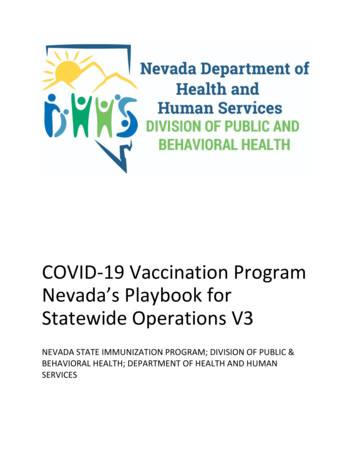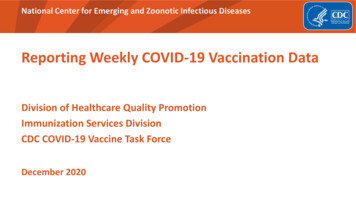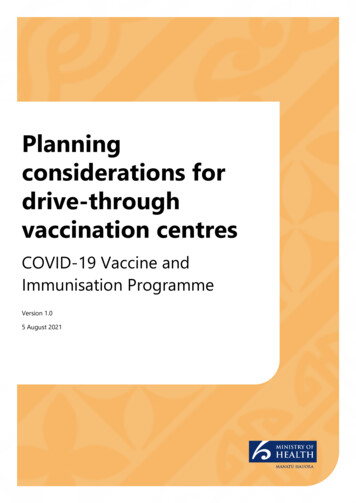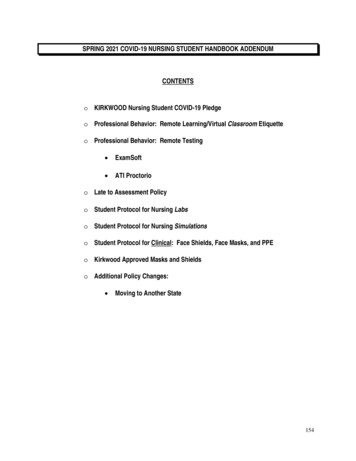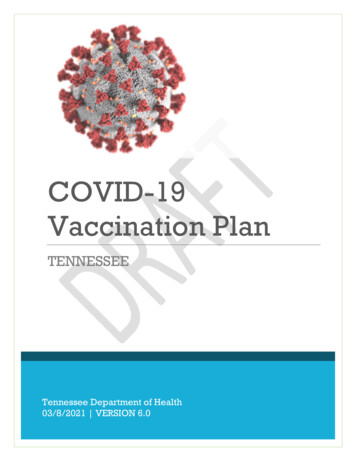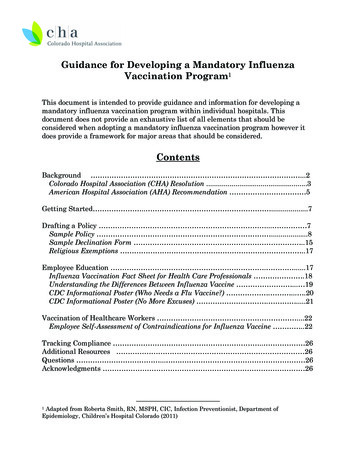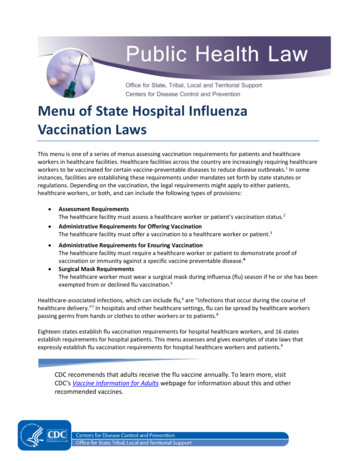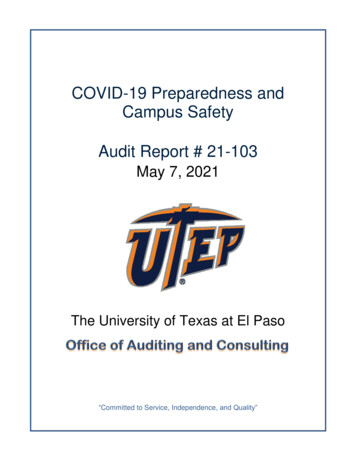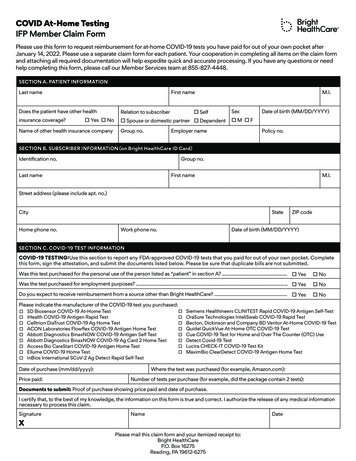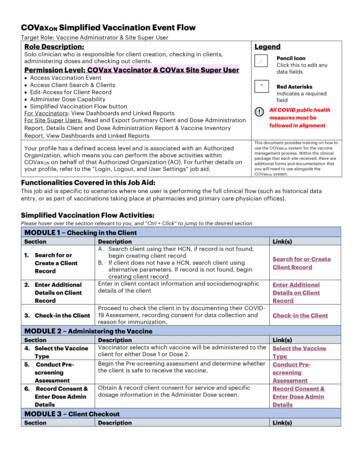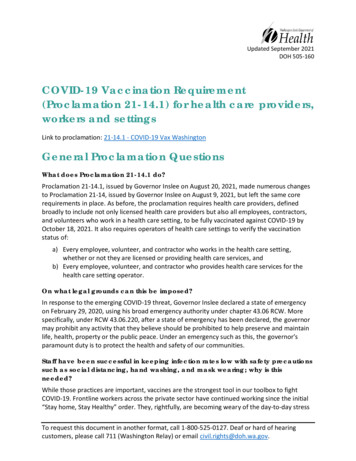
Transcription
Updated September 2021DOH 505-160COVID-19 Vaccination Requirement(Proclamation 21-14.1) for health care providers,workers and settingsLink to proclamation: 21-14.1 - COVID-19 Vax WashingtonGeneral Proclamation QuestionsWhat does Proclamation 21-14.1 do?Proclamation 21-14.1, issued by Governor Inslee on August 20, 2021, made numerous changesto Proclamation 21-14, issued by Governor Inslee on August 9, 2021, but left the same corerequirements in place. As before, the proclamation requires health care providers, definedbroadly to include not only licensed health care providers but also all employees, contractors,and volunteers who work in a health care setting, to be fully vaccinated against COVID-19 byOctober 18, 2021. It also requires operators of health care settings to verify the vaccinationstatus of:a) Every employee, volunteer, and contractor who works in the health care setting,whether or not they are licensed or providing health care services, andb) Every employee, volunteer, and contractor who provides health care services for thehealth care setting operator.On what legal grounds can this be imposed?In response to the emerging COVID-19 threat, Governor Inslee declared a state of emergencyon February 29, 2020, using his broad emergency authority under chapter 43.06 RCW. Morespecifically, under RCW 43.06.220, after a state of emergency has been declared, the governormay prohibit any activity that they believe should be prohibited to help preserve and maintainlife, health, property or the public peace. Under an emergency such as this, the governor’sparamount duty is to protect the health and safety of our communities.Staff have been successful in keeping infection rates low with safety precautionssuch as social distancing, hand washing, and mask wearing; why is thisneeded?While those practices are important, vaccines are the strongest tool in our toolbox to fightCOVID-19. Frontline workers across the private sector have continued working since the initial“Stay home, Stay Healthy” order. They, rightfully, are becoming weary of the day-to-day stressTo request this document in another format, call 1-800-525-0127. Deaf or hard of hearingcustomers, please call 711 (Washington Relay) or email civil.rights@doh.wa.gov.
of high and dangerous caseloads. Significant efforts have been made to address workplacesafety in the face of COVID-19, a new workplace hazard. Even with all of those safety efforts,we did not curtail all outbreaks. The threat of COVID-19 is evolving as new more easilytransmitted and aggressive variants become prevalent in our state. We now have the tool ofCOVID-19 vaccines, which is the single most effective resource to combat spread and preventillness and death.When will this be in effect?The first version of the order was effective as of August 9. The deadline to become fullyvaccinated is October 18, 2021. In order to be considered fully vaccinated by October 18, youmust receive your second dose in a two-dose COVID-19 vaccine series or a dose of a single-dosevaccine approved or authorized for emergency use by the FDA or WHO on or before October 4,2021. If you do not meet these deadlines, including by providing proof to the operator of healthcare setting where you work, then you are not permitted to work there, unless the operator hasprovided you a disability or religious accommodation.To whom does the proclamation apply?The proclamation requires “health care providers” to get vaccinated. This term is definedbroadly to include more than just licensed health care providers. It includes: Individuals holding a license, certification or registration from the Washington StateDepartment of Health, listed here, who are actively practicing or providing services topeople.Individuals who are permitted by law to provide health care services in a professionalcapacity without holding a credential from the Department of Health and are activelyproviding services to people.Long-term care workers, with limited exceptions described below.On-site workers in any health care setting, regardless of whether they are licensed orproviding health care services (for example administrative support staff who work inperson in a clinic or cleaning service workers). On-site workers include employees,contractors, and volunteers engaged in work in a health care setting.If a health care provider is authorized to practice in Washington under atemporary workforce recognition, or volunteer registry, does the vaccinemandate apply to them?Yes. Individuals such as these who are permitted by law to provide health care services in aprofessional capacity without holding a credential are health care providers subject to theproclamation.Is a therapist in a child advocacy center covered by the mandate?Yes, because a therapist is a health care provider, and all actively practicing health careproviders are required to be vaccinated. The operator of the child advocacy center is requiredto verify the vaccination status of a therapist who provides services there only if the childadvocacy center is primarily used for delivering in-person health care services to people,making it a health care setting.2
To whom does the proclamation not apply? Health care providers/workers working only in the following settings are not required tobe vaccinated under the proclamation:o Settings where sports and spectator events or other gatherings are held(including when credentialed athletic trainers are providing care to players),excluding areas primarily used for the delivery of health care services, such asdesignated first aid areas (are Health Care Settings)o Department of Children, Youth & Families (DCYF)-licensed foster homes that donot primarily provide health care serviceso Research facilities where no health care is delivered to peopleo Veterinary health care settingso Animal control agencieso Non-profit humane societiesHealth care providers who are not actively practicing or providing services are notrequired to be vaccinated under the proclamation.Additionally, the proclamation does not apply to individuals who provide only personalcare services, as defined in RCW 74.39A.009(24), in people’s homes. Personal careservices are defined as physical or verbal assistance with activities of daily living andinstrumental activities of daily living provided because of a person's functional disability(RCW 74.39A.009(24).How is health care setting defined?For the purposes of the proclamation, a health care setting is any public or private place that isprimarily used for the delivery of in-person health care services to people, unless specificallyexempted by the proclamation.If the location is primarily used for the delivery of health care services, such as a hospital, thenthe entire facility is a health care setting.Other businesses and facilities may have a section of their location that is considered a healthcare setting, such as a pharmacy within a grocery store, school nurse’s office, massagetreatment area within a spa, or vaccination clinic within a business establishment. In thissituation, the health care setting includes only the areas that are primarily used for the deliveryof health care. Other areas of the facility are not considered health care settings.Health care settings include, but are not limited to: Acute care facilities, including, but not limited to, hospitalsLong-term acute care facilitiesInpatient rehabilitation facilitiesInpatient behavioral health facilities, including, but not limited to, evaluation andtreatment facilities, residential treatment facilities, and secure detox facilitiesResidential long-term care facilities, including, but not limited to, nursing homes,assisted living facilities, adult family homes, settings where certified communityresidential services and supports are provided, and enhanced services facilitiesMobile clinics or other vehicles where health care is delivered, such as ground and airambulances3
Outpatient facili
practice since they hold a state-issued credential. But the obligation for a health care setting operator to verify the vaccination status of health care providers engaged in work for them doesn't apply to tribal health care settings. If an entity employs or contracts with health care providers to provide health
